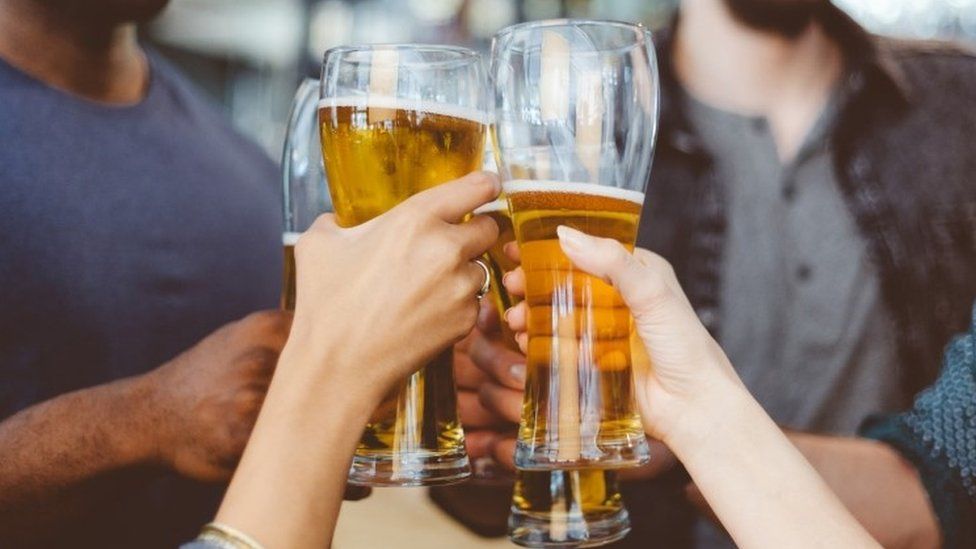Alcohol duty: Chancellor Kwasi Kwarteng scraps planned increase
- Published
- comments

Chancellor Kwasi Kwarteng has scrapped planned increases in the tax paid on beer, wine, spirits and cider.
The duty paid on alcohol is re-valued each year to keep pace with inflation - though it has been either cut or frozen in every budget since 2013.
A new alcohol duty system, announced by Mr Kwarteng's predecessor Rishi Sunak, will be implemented from 1 August 2023.
Announcing the plans, Mr Kwarteng said it was wrong to raise duty "at this difficult time".
"Our drive to modernise also extends to alcohol duties," he said during his speech in the House of Commons setting the mini-budget.
"I have listened to industry concerns about the ongoing reforms."
Cuts to duty on draught beer and cider by 5%, introduced to help pubs hit by pandemic closures, will be extended from February 2023 to cover kegs as small as 20 litres.
This will "help smaller breweries," Mr Kwarteng said.
The Campaign for Real Ale (CAMRA) called the policy "groundbreaking".
CAMRA Chairman Nik Antona said extending draught relief will "help pull consumption into pubs, clubs and taprooms helping to encourage pub-going and keeping our beloved locals viable, alive and thriving".
Mr Kwarteng also announced an 18-month transitional measure for wine duty, while the government reforms the system.
Alcoholic drinks are classed into tax categories - beer, cider, wine, sparkling wine and spirits.
There are 15 different tax rates based on type of alcohol, strength and production method. Under the new system this will be reduced to six rates.
Nearly one in ten restaurants and bars closed permanently in the UK following a series of lockdowns during the pandemic.
Hospitality businesses have reported soaring costs, following an increase in energy costs and inflation hitting food and drink prices.
The Food and Drink Federation predicts increases in the price of food may not hit their peak until next year, following the impact of the war in Ukraine.
Kate Nicholls, CEO of UK Hospitality, said: "The freeze on alcohol duty announced today is a very positive move for the breweries and drinks producers that supply the hospitality sector.
"It will not, however, necessarily help operators keep prices low for their customers nor does it put cash in those customers' pockets.
"If the government wants to support the hospitality sector it needs to swiftly bring forward a package of targeted support that includes a lower rate of VAT for the sector and the reform of business rates."
Richard Piper, chief executive of campaign group Alcohol Change UK, said: "Cancelling the planned increase on alcohol duty is damaging and will cause more harm than good. Evidence clearly shows that cutting duty increases alcohol harm."
Prior to 2010 the Labour government applied were committed to increasing alcohol duty rates each year in real terms - known as the duty escalator. The coalition government scrapped this in 2010.
The Office for Budget Responsibility (OBR) forecast that alcohol duties were expected to raise £12.7bn this year.
Related Topics
- Published6 November 2022
- Published17 October 2022
- Published26 February 2021